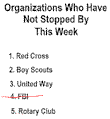
Please Read This.
is a free service provided by Lance Brown, Candidate for President in 2008. You can visit his campaign site and weblog here.
E-mail Updates List
Bipartisans is the Craziest Peoples!
California Recall
Civil Liberties
Criminal "Justice"
Democrats
Drug War
Educational Freedom
Greens
Human Rights
Humor
Left V Right
Libertarians
Media
Presidential Campaigns
Republicans
Science
Site Announcements
The Big I
Thought and Thinking
Uncle Sam
War
Youth Rights
About Lance Brown
The Campaign "Elevator Pitch"
The Longer Pitch: The Future of America is Freedom
10 Easy Ways to Help the Campaign
Join the On-The-Road Support Network
Contact Lance
 |
NEW! E-Actions for Freedom -- Easy online actions for advancing the cause of freedom, frequently updated.
PNAC.info -- An effort to investigate, analyze, and expose the Project for a New American Century, and its plan for a "unipolar" world.
CampusLP.org -- Free web sites for campus libertarian clubs!
The Nevada County Libertarian Party -- "Your Local Party of Principle" (Chairman)
The Nevada County Bill of Rights Defense Committee -- Dedicated to Creating a Civil Liberties Safe Zone in Nevada County, California. (Co-founder)
The Free School on the Internet -- A developing effort to create a superior online K-12 school, with free attendance.
StopCarnivore.org -- Stop the FBI Spy Tool Carnivore Now!"
GreenLiberty.org -- Where Green values meet Libertarian principles.
Pictures of The Bill of Rights
Tips for Promoting a Campus Event
198 Methods of Nonviolent Action
My (many) e-zine and list subscriptions
The History of Drug Prohibition in the U. S.
The Bill of Rights -- Full Text
Support freedom in our lifetime:

"I do not shrink from this responsibility, I welcome it."
A Little Worried About America
Boston Public: The Case Against Schools
The USA-PATRIOT Axe
The Nader 2004 "threat", and those poor, pitiful Democrats
Book Recommendation: Healing Our World
Taboos, skews, and contradictions
North Korea's Sensible Delusions
Lance on Regulation
"I'm pro-Lance as long as I'm not also
running for prez" -
Mojo Nixon,
entertainer and revolutionary
"Wow I am amazed and joyous! Your views are just what this country needs! I am going to spread the word about your campaign." - Elizabeth Ward
"I read every article posted on your site and was amazed to find myself repeatedly saying 'Wow, I agree with that.'"
"You are probably this country's last chance at
freedom in this lifetime."
- ¡Obay!
"I stumbled upon your website and it is
WONDERFUL.
You can count on MY VOTE and MY SUPPORT in 2008!!!" -
Alan Handleman,
Grayson, KY
"I just want to take a minute to tell you that we really do appreciate your writing over here. I find the state of this country (and its flock of good frickin' citizens) so outrageous that I mostly sit around pulling my hair out and fantasizing about Canada... sometimes Iceland... But, incredibly, you don't stew! It's like you're on a whole other plane. It's so easy to lose sight of reality with all that glare from the fancy magic show illusions of our 'two' party system. Seriously. Your message is hopeful and real."
-Kristen Werner, Rollinsford, N.H.
August 17, 2003The Other Guevara:Costa Rica's Libertarian revolutionaryReason interviews Costa Rica's Libertarian revolutionary Excerpt: Perhaps surprisingly, the most successful libertarian party in recent years has arisen in Latin America, where left and right wing variants of statism have been the norm for much of the 20th century. In Costa Rica, the ten-year-old Movimiento Libertario has managed to elect six diputados to the country's 57-seat congress. The chief architect of that success was Otto Guevara, who served as the party's first elected diputado, from 1998 to 2002. In late July, he spoke with Reason during a visit to Washington, D.C.'s Cato Institute.
To understand the birth of Movimiento Libertario, you need to put yourself in the context of the Costa Rica of that time. Costa Rica is a substantially socialist country, with a state monopoly on alcohol, a state monopoly on insurance. There's a state monopoly in telecommunications, in agriculture, in fuel refinement and distribution. Education is constitutionally free, mandatory, and run by the state. Ninety-three percent of the population, girls and boys, attends public, state schools. Costa Rica, like a majority of the Latin American states, experimented with a development scheme based on import substitution. It closed its borders, turned inwards. The state began to make inroads in many other industries—production of fertilizers, of cement, of cotton, of tuna. They had state tuna catching boats! Bankrupt industries were bought by the state with the idea of saving jobs. That's how the state ended up running industries that make chocolates or catch shrimp. It led to $7 billion in losses for Costa Ricans. In the 1980s, a new form of politics emerged. In the '70s, they had put people on the public payroll. That was no longer sustainable. So they began a practice of instead granting privileges to unions and forced firms to buy licenses for, say, running cabs. These privileges were politically assigned, and as there were three principal banks, heavily controlled by the state, until recently loans, too, were politically assigned. There were a range of giveaways to the poor as well, like the bono alimenticio to pay for food. A lot of people stopped working because food was guaranteed. Then came the bono de la vivienda or the bono de vivienda popular: $10,000 as a gift of the state for housing. To free education, they added a new benefit called the beca, or bono escolar to pay for schoolbooks. This is the origin of our movement. Nobody was defending liberty. And it was being lost at an accelerated rate. Read It Rating: 9.5 Comments
Post a comment
|
Your email address: Message (optional):
Recent Entries
Search This Site
Explore the Archives
Category Archives
Big Brother Bipartisans is the Craziest Peoples! California Recall Civil Liberties Criminal "Justice" Democrats Drug War Educational Freedom Greens Human Rights Humor Left V Right Libertarians Media Presidential Campaigns Republicans Science Site Announcements The Big I Thought and Thinking Uncle Sam War Youth Rights
I'm a Member of:
Libertarian Party
Libertarian Party of California Nevada County Libertarian Party Nevada County Bill of Rights Defense Committee American Civil Liberties Union Amnesty International International Society for Individual Liberty
Blog Places
Blogarama
Top Blogs RCS Blogdex DayPop Technorati Blo.gs Popdex Blogosphere Blogwise Weblogs.com BlogCritics The Weblog Review Blogarithm BlogLinker Globe of Blogs BlogTracker Blog of the Day
Blogroll
Web Rings I'm In
|
All contents of this site Copyright © 1996-2003 by Lance Brown for President in 2008.
Please distribute and link freely; and please let us know by e-mailing editor@freedom2008.com.
Thank you very much for your visit.
|
[Previous 5] [Previous] [Skip 1] [Next] [Next 5] [List] [Join] |

